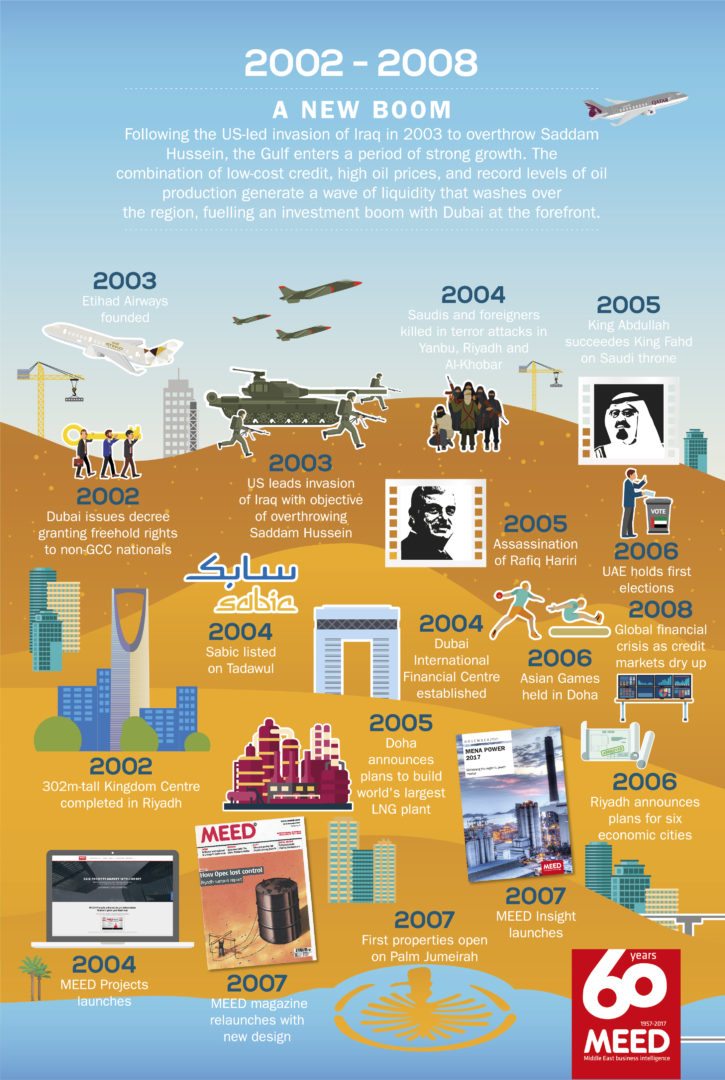

Following the US-led invasion of Iraq in 2003 to overthrow Saddam Hussein, the Gulf entered a period of strong growth. The combination of low-cost credit, high oil prices and record levels of crude production generated a wave of liquidity that washed over the region, fuelling an investment boom with Dubai at the forefront

MEED 2002-2008 infographic
MEED 2002-2008 infographic
The 11 September 2001 terrorists attacks on New York and Washington shook the world and in response US President George W Bush declared a war on terror. With all of the 19 terrorists involved in the attacks hailing from the region, it came as no surprise that US retaliation would have a profound impact on the Middle East.
Washington quickly formed an international coalition to strike at Al-Qaeda in the caves of Afghanistan. But attention soon fell on the less obviously connected target of Iraq, where the US had unfinished business. After a year of building support, as well as a legal case, to overthrow President Saddam Hussein, the US invaded in February 2003.
Victory swiftly followed and a US-backed administration took control of the reconstruction of Iraq. Unfortunately, Washingtons post-war arrangements were not as well thought out as the invasion and security problems and corruption destabilised the country. Anti-Western sentiment spread, sparking a rise in terrorist attacks that culminated in the 2004 murder of Saudi nationals and foreigners in Yanbu, Riyadh and Al-Khobar.
Washington accelerated its agenda to spread democracy and the first elections were held in several countries, including municipal elections in Saudi Arabia in 2005 and federal elections in the UAE in 2006. But the neo-conservative drive failed in Manama in 2005, when the US regional allies, including Egypt and Saudi Arabia, refused to sign up to commitments to support democratic reform.
At the same time, the Gulf entered a period of strong economic growth. The combination of low-cost credit, high oil prices and record levels of crude production generated a wave of liquidity that fuelled an investment boom. In 2002, Dubai issued a decree granting freehold rights to non-GCC nationals, allowing foreign ownership of property for the first time in the GCC and supporting a wave of investments in iconic real estate projects. GCC governments sought to tap into a global financial boom through the expansion of its stock markets.
But as the regions financial and property markets began to overheat, the first rumours of trouble began. The collapse of the US subprime mortgage market in 2007 triggered a global financial meltdown in 2008 and a crash in oil prices that brought the regions latest boom to a shuddering halt.
You might also like...

Red Sea Global awards Marina hotel infrastructure
18 April 2024

Aramco allows more time to revise MGS package bids
18 April 2024

Morocco tenders high-speed rail project
18 April 2024
A MEED Subscription...
Subscribe or upgrade your current MEED.com package to support your strategic planning with the MENA region’s best source of business information. Proceed to our online shop below to find out more about the features in each package.









